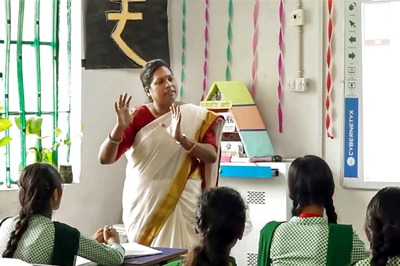
views
“Like branding a buffalo with a hot iron to cure a bullock of fever” – is an earthy proverb used in rural Karnataka to highlight the mismatch between an existing malady and an applied remedy. Aadhaar- or Unique Identification (UID), we have been told repeatedly, is necessary to plug the leaks in and the misuse of the welfare distribution system which accounts for an incredible 3% of our annual Gross Domestic Product (GDP). So, instead of acknowledging its utter failure to identify and punish the undeserving who bleed the system, the government has been compelling the underprivileged to part with their personal details, photos and biometrics like finger prints and iris scans to be stored in a database for use to improve the efficiency of the benefits and services delivery mechanism.
Ironically, the Supreme Court’s Constitution Bench, by a 4:1 majority, gave its stamp of approval to this tech-savvy solution invented by coercive governments—both present and past. The marginalised, it seems must pay for the sins of the well-heeled and the powerful and this is justifiable in the service of a “legitimate State interest”.
The majority view (recorded in two separate opinions) may appear very nuanced and pragmatic until it is diffracted through the prism of the principles and approach that informs the minority opinion of the apex court.
First, the minority view asks a very basic question- if Section 3 of the Aadhaar Act makes UID an entitlement, why does Section 7 make its possession or at least enrolment, a compulsion for availing benefits and services paid for from the Consolidated Fund of India? To the best of my knowledge the majority view has not even addressed this basic contradiction. With deep respect to the apex court, many of us find the silence of the majority view deafening.
Second, the privileged among us are grateful to the court for delinking Aadhaar from telephone connections and bank accounts without realising that this relief may be illusory. Thanks to the KYC rules implemented by banks, a PAN card issued by the Income Tax Department is an indispensable document for opening bank accounts and investing in fixed deposits without which tax will be deducted at the highest applicable rate. When the court has upheld the PAN-Aadhaar linkage under the Income Tax Act, it would be impossible to open a bank account without PAN and by logical extension, without Aadhaar. With the Union Cabinet approving a programme for opening a bank account for every citizen in the country, in our humble opinion, the relief that the majority view has provided for the middle class becomes no more than a mirage.
Third, while adults have no choice but to enrol (and not just for availing government benefits and services as argued above,) the majority view permits children to opt out of Aadhaar upon reaching the age of 18 years. This relief too may not amount to any kind of voluntary exclusion from the Aadhaar regime as the young adult will have to enrol for obtaining any government scholarship or for acquiring PAN. So in our humble opinion, the only escape from the clutches of Aadhaar may be possible if one were to adopt the Vanaprastha stage of life and move residence to a forest, and eat roots and shoots. Aadhaar cannot be voluntary by any stretch of imagination. There is nothing unique about it, everybody is covered.
Fourth, with the deepest respect to the wisdom of the Supreme Court, it must be said that the minority view’s meticulous analysis of the ‘whats’ and the ‘hows’ of a Money Bill is more convincing than the laborious legitimisation of the Honourable Speaker, Lok Sabha’s actions labelling the Aadhaar Bill as a Money Bill, attempted by the majority.
The minority view: “Significantly, Section 7 (of the Aadhaar Act) does not declare the expenditure incurred on services, benefits and subsidies, to be a charge on the Consolidated Fund of India”, has not merited even a mention in the majority view. Indeed, when a legislation makes no provision at all for the collection or the spending of even a paisa’s worth of public funds, how does it attract the label “Money Bill”, pray tell?
Recently, laws amended to absolve political parties from criminal action for received foreign funding in blatant violation of the regulatory regime, or to make political party funding opaque (through electoral bonds) have all been certified “Money Bills” by the Honourable Speaker. All these laws are now open to judicial review thanks to the Aadhaar views (both majority and minority) and the fig leaf of “legitimate State interest” may not be available to save them.
All said and done, the apex court’s opinions in the Aadhaar case does create some new spaces for civil society action. “Manifest arbitrariness” has received firm judicial recognition as a ground on which the constitutionality of any law can be challenged. This is in addition to two well-known grounds—namely, lack of legislative competence and the violation of one or more fundamental rights guaranteed by the Constitution.
More importantly there is some good news for citizens and activists who use the RTI Act to seek information from government. The Constitution bench has recognised that all kinds of information personal to an individual will not attract the protection of the fundamental right to privacy under Article 21 of the Constitution. Only such personal information will be protected where it can be demonstrated that there was a reasonable expectation of secrecy from the concerned individual. Hopefully, this principle will be of help in reducing the trend in public authorities and Information Commissions to protect the very public activities of government servants under the false guise of privacy.
(Venkatesh Nayak is with the Commonwealth Human Rights Initiative, New Delhi. Views are personal.)



















Comments
0 comment